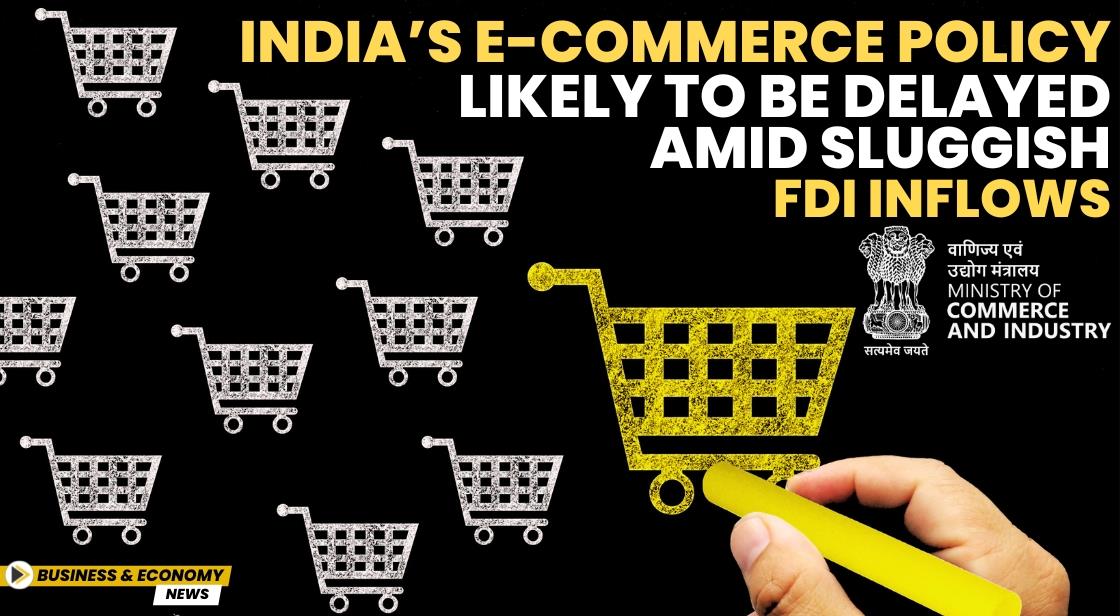India’s E-commerce Policy Likely to Be Delayed Amid Sluggish FDI Inflows

News Synopsis
The development of a comprehensive e-commerce policy in India, which began in 2018, seems to be facing further delays. According to sources familiar with the situation, the government's current priority is maintaining a stable environment for major players like Walmart-owned Flipkart and Amazon, especially considering the recent slowdown in foreign direct investment (FDI) inflows.
Putting Policy on the Back Burner
Sources claim that during a recent high-level review meeting, the decision was made to temporarily postpone work on the e-commerce policy. This prioritizes attracting foreign investment over implementing potentially disruptive regulations in the e-commerce sector. The Ministry of Commerce has not yet responded to requests for comment on this development.
Challenges with the First Draft
The initial draft of the e-commerce policy, released in February 2019, faced criticism for its broad scope. It attempted to address various aspects of the online ecosystem, including data regulation, antitrust measures, intellectual property protection, and consumer safeguards. Industry representatives found the draft to be too complex and difficult to implement.
Following industry feedback, the Ministry of Commerce and the Department for Promotion of Industry and Internal Trade (DPIIT) revised the draft. However, a complete revised version has not yet been presented to stakeholders.
"Since then, nobody in the industry has seen a complete revised draft yet. In a meeting with industry leaders last year, a presentation with only five bullet points outlined the broad goals of the policy, such as ensuring e-commerce companies treat consumers fairly," said a senior executive from an e-commerce company.
Balancing FDI Needs and E-commerce Regulation
There's speculation that the government is prioritizing job creation within the e-commerce sector, which currently employs an estimated 2 million people with salaries ranging from Rs 15,000 to Rs 20,000 per month. Disrupting this ecosystem with strict regulations might be counterproductive to this goal.
Furthermore, established e-commerce giants like Flipkart and Amazon are deeply invested in India, and the government may be reluctant to risk jeopardizing their continued operations through stringent regulations. However, an unstable policy environment could also discourage future foreign investment.
India's online retail sector is currently dominated by Flipkart and Amazon, with a combined market share exceeding 80% according to a report by brokerage firm AllianceBernstein earlier in 2024. These companies have made significant investments in India, with Walmart spending over $24 billion on Flipkart and its fintech arm PhonePe since 2018, and Amazon pledging $30 billion in investments for its e-commerce and cloud businesses by 2030.
Focus on Attracting FDI
Recent data from the DPIIT shows that India's net FDI inflows declined by 3.5% year-on-year in FY24, reaching $44.42 billion, the lowest level in five years. The government has set an ambitious target of attracting $100 billion in FDI over the next five years and aims to further liberalize FDI policies. Given this goal, it seems the government is prioritizing attracting foreign investment over introducing new regulations in the e-commerce space for now.
Contentious Provisions in the Draft Policy
Reports suggest that the new draft policy might restrict the sale of private labels on e-commerce marketplaces, a move that has reportedly been met with strong opposition from several domestic conglomerates. Another potentially contentious provision could prohibit e-commerce firms from offering additional services like logistics and payments.
"A core principle of large e-commerce platforms is leveraging economies of scale to bundle various services together. Disrupting this established business model after billions of dollars have been invested would be detrimental," commented a former executive from a leading e-commerce company.
Overlapping Regulations and Re-evaluation
With various government entities already developing separate laws and guidelines for data protection, payments, and digital competition, the Commerce Ministry and DPIIT might be re-evaluating the scope of the e-commerce policy. Additionally, there might be internal disagreements about the policy's primary objectives.
In 2023, Rohit Kumar Singh, the then consumer affairs secretary, stated that his department prioritized consumer protection, while the DPIIT focused on promoting e-commerce growth. This difference in priorities, along with extensive consultations with stakeholders, contributed to the delay.
Protecting Domestic Sellers: A Shifting Approach?
One of the original motivations for the e-commerce policy was to safeguard domestic sellers and small businesses from the dominance of Amazon and Flipkart. However, a recent trend suggests the government might be promoting the Open Network for Digital Commerce (ONDC) as an alternative solution for these sellers.
The ONDC is a government-backed initiative that aims to create a level playing field for all sellers by establishing an open network where any seller can list their products on any participating online platform. This approach could potentially reduce dependence on major e-commerce platforms and empower smaller sellers.
However, the ONDC is still in its early stages of development, and its effectiveness in promoting competition and protecting domestic sellers remains to be seen. Some industry experts believe that the ONDC might struggle to attract a critical mass of sellers and buyers, hindering its ability to create a viable alternative to established e-commerce giants.
You May Like









